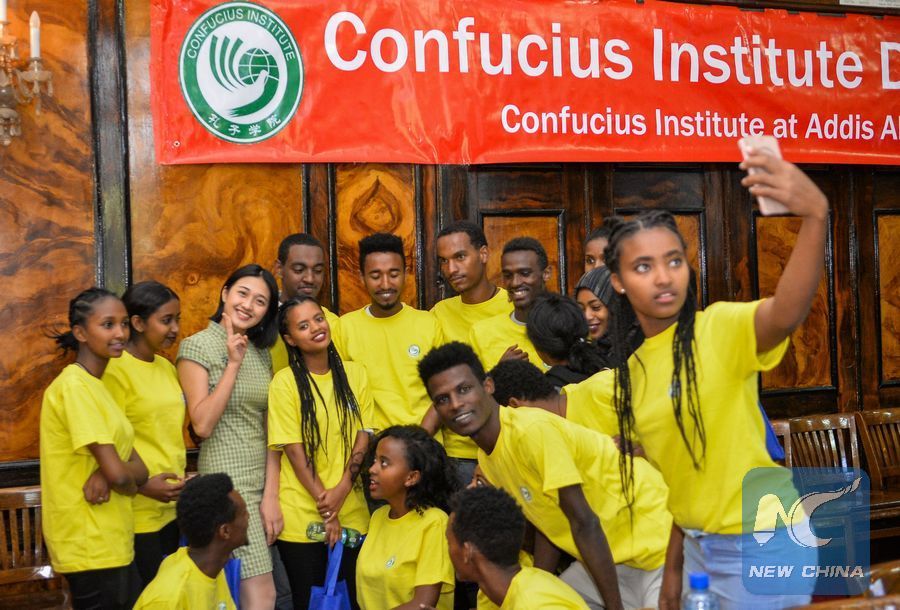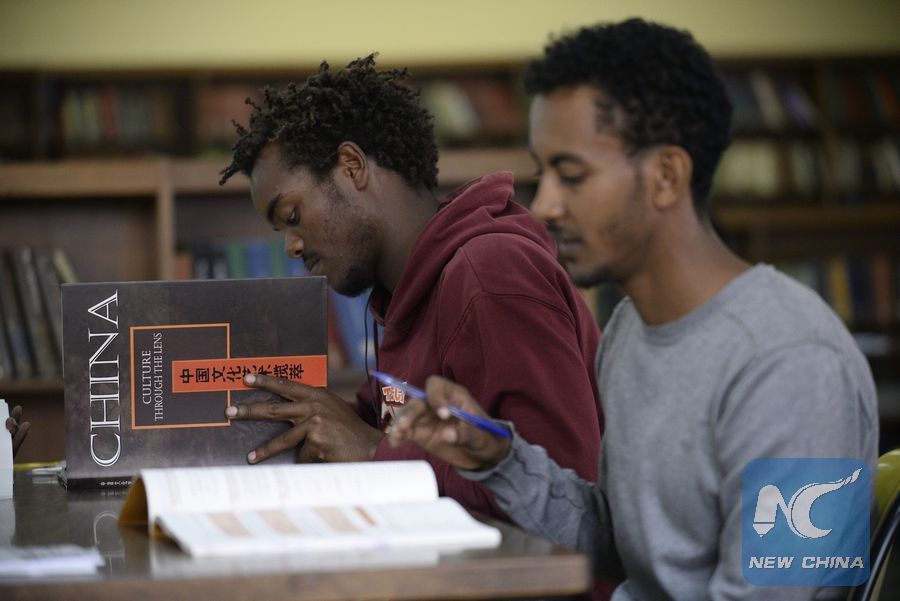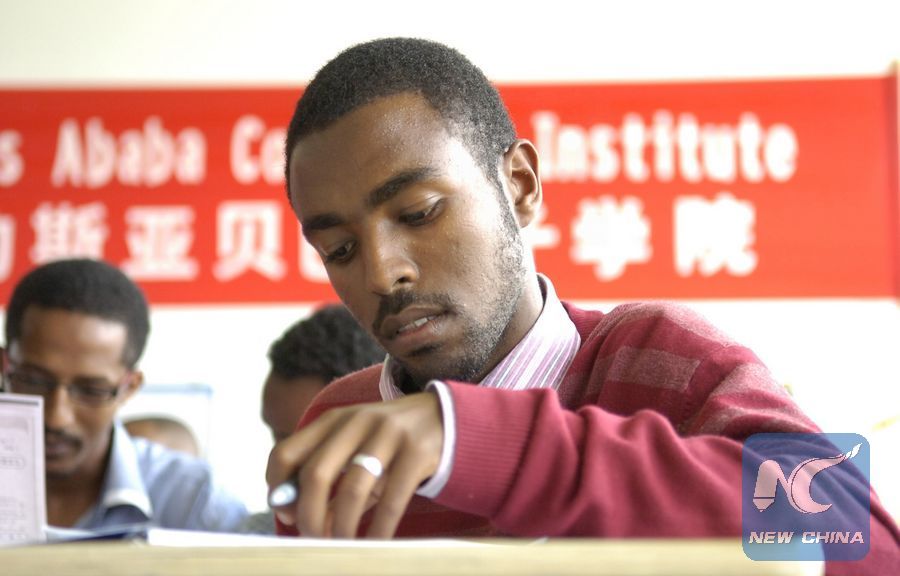
File photo shows Ethiopian students take a selfie at the Confucius Institute at Addis Ababa University (AAU) while celebrating Confucius Institue Day in Addis Ababa, capital of Ethiopia, Nov.13, 2018. (Xinhua/Michael Tewelde)
ADDIS ABABA, Jan. 21 (Xinhua) -- Bereket Daniel has been studying Mandarin for more than a year at the Federal Technical and Vocational Education and Training (TVET) Institute in the Ethiopian capital, Addis Ababa.
Daniel, an electrical engineering lecturer at the TVET, is among a rising number of Ethiopians learning the Chinese language to boost their job opportunities with Chinese firms in the east African country as well as with local ones seeking deeper engagement with China and the greater China market.
"Chinese language, which is still a new experience for many of us in Ethiopia, has recently become an important skill due to the increasing involvement of Chinese people and companies in our country," Daniel told Xinhua on Friday.
"You can simply observe the great number of students and teachers in our institute who are eager to learn Chinese," she said. "The rising interest can illustrate the huge demand for Chinese language (skills) among our society."
Daniel, who is pursuing a master's degree in electrical engineering, said studying Chinese language is "equally important" as academic qualifications, mainly due to the ever-increasing engagement of Chinese professionals and technologies in Ethiopia's industrialization drive.
"The fact that Chinese language is currently mastered by very few Ethiopians is another great opportunity for us to get the most out of it," she said.

File photo shows students study at a library in the Addis Ababa University, Addis Ababa, capital of Ethiopia, March 28, 2017. (Xinhua/Michael Tewelde)
A Chinese language education program, provided by the Confucius Institute at the TVET Institute, offers free Mandarin Chinese courses to meet an increasing demand from young Ethiopians to learn the language.
In addition to the federal TVET Institute, Chinese language studies is also provided in four other public universities across Ethiopia, including the country's largest, Addis Ababa University, in the capital, Bahir Dar University, in Ethiopia's northwestern Amhara regional state, Mekelle University in northern Ethiopia, as well as Arsi University, in Ethiopia's largest Oromia regional state.
Li Yaohui, director of Confucius Institutes in Ethiopia, said more Confucius Institutes will be set up in Ethiopian higher education institutions.
The major driving force behind the increase in the provision of Chinese language training, he said, is the ever-increasing demand from young Ethiopians to learn the language.
"In addition to the various Chinese enterprises where Chinese language proficiency is considered as an added value, the demand for Chinese language is also recently increasing among various Ethiopian companies," Li said, citing the Ethiopian Airlines Group as a prime example.
The group, widely considered as Africa's fastest growing airline, now hire Chinese flight attendants to cater to the needs of its huge number of Chinese customers.
Close to 4,000 Chinese passengers use its services on a daily basis, the Ethiopian flag carrier said recently.
ATTRACTIVE TO FRESHMAN STUDENTS
Provided by the Confucius Institute in partnership with hosting higher education institutes, Chinese language proficiency training is nowadays attracting a growing number of college freshman students, mainly due to the rich employment opportunities it offers.

File photo shows the Addis Ababa Confucius Institute launches a basic Chinese training for instructors of the Ethio-China Polytechnic College for free on May 4, 2010. (Xinhua/Michael Tewelde)
Beza Solomon, a Chinese language graduate from the Confucius Institute at Addis Ababa University, said she had received job offers from three Chinese firms well before graduation.
While jobs were difficult to come by for students pursuing other fields of study, Solomon said, her challenge upon graduation was to decide which Chinese company to pick.
Solomon, now working for PowerChina International Group Limited (PCIGL) in Ethiopia, said demand for Chinese-speaking Ethiopian employees has seen remarkable increase over the past few years as Ethiopian enterprises seek to attract bilinguals to work more effectively with Chinese partners.
CEMENTING PEOPLE-TO-PEOPLE TIES
As Ethiopia and China, both endowed with rich cultural heritages that have progressed for thousands of years, further strengthen their relations, Confucius Institutes here will work harder to bridge their cultural gaps through intercultural activities.
"Cultural exchange is the most important objective of Confucius Institutes in Ethiopia," Li said, adding that the institutes will help enable Ethiopians to better understand Chinese culture and help the Chinese community in Ethiopia to learn more about the host country's rich cultural heritages.
"Our work is bi-cultural, in which we help both Ethiopian and Chinese people to better comprehend the two historic cultural heritages," he said.
Teshalle Bercha, a TVET official, also emphasized the need to strengthen partnership in cultural exchanges.
"The two countries have various positive cultural values that date back for centuries," he said, stressing that the two peoples "have various positive cultural aspects to learn from the other."
"We are very happy about the Confucius Institute in our institute... for pioneering the cultural exchange endeavors," Bercha said.

